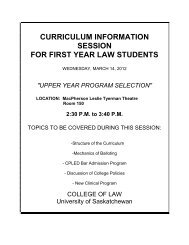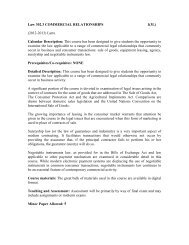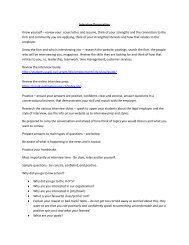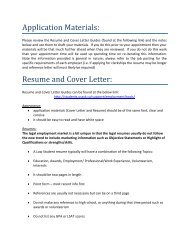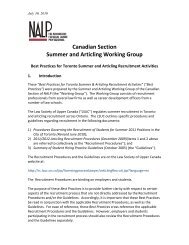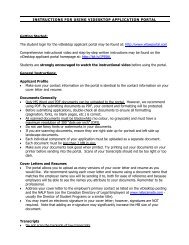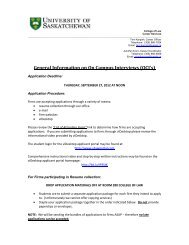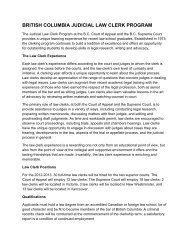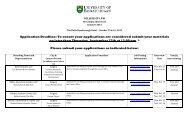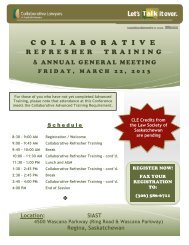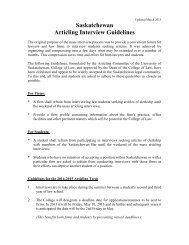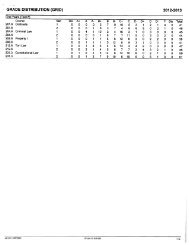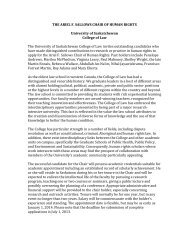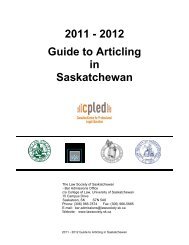2010 of NOTE - College of Law - University of Saskatchewan
2010 of NOTE - College of Law - University of Saskatchewan
2010 of NOTE - College of Law - University of Saskatchewan
You also want an ePaper? Increase the reach of your titles
YUMPU automatically turns print PDFs into web optimized ePapers that Google loves.
The 2009 Silas E. Halyk, Q.C. Visiting Scholar in<br />
Advocacy<br />
David Scott, Q.C., November 2009 – “Advocacy Now and<br />
Then: Access to Justice and Advocacy in the Electronic Age”.<br />
A generous gift from Silas E. Halyk and other individuals has<br />
provided funding to create The Silas E. Halyk, Q.C. Visiting<br />
Scholar in Advocacy. This funding supports an annual visit by<br />
a distinguished legal advocate, as well as student advocacy<br />
exercises and workshops with the Visiting Scholar. Mr. Halyk,<br />
an alumnus and a prominent <strong>Saskatchewan</strong> practitioner, has<br />
made many contributions to the legal pr<strong>of</strong>ession in <strong>Saskatchewan</strong><br />
and across Canada throughout his career.<br />
The first Halyk Visiting Scholar, David Scott is one <strong>of</strong> Canada’s<br />
leading advocates and has received numerous awards and<br />
distinctions in legal advocacy. In 2003 he served as President<br />
<strong>of</strong> the America <strong>College</strong> <strong>of</strong> Trial <strong>Law</strong>yers and in 2007 was<br />
elected Chair <strong>of</strong> Pro Bono <strong>Law</strong> Ontario.<br />
Mr. Scott brought his customary vision to the justice system <strong>of</strong><br />
the future and the role <strong>of</strong> the advocate in that system. Noting<br />
the widespread availability <strong>of</strong> knowledge about law and<br />
the justice system, the cost <strong>of</strong> legal representation and the<br />
growth <strong>of</strong> citizen empowerment, Mr. Scott reflected on a future<br />
which will require courts and lawyers to imagine new ways <strong>of</strong><br />
functioning so that justice, and our commitment to the justice<br />
system, can be sustained.<br />
The Heald Lecture in Administrative <strong>Law</strong><br />
The Honourable Justice John Evans, March 2009 - “The<br />
Standard <strong>of</strong> Judicial Review, Post-Dunsmuir”.<br />
Established in 1985, the Heald Lecture Series is in honour <strong>of</strong><br />
the Honourable Darrel Heald, former Justice <strong>of</strong> the Federal<br />
Court <strong>of</strong> Appeal and alumnus <strong>of</strong> the <strong>College</strong> <strong>of</strong> <strong>Law</strong>. This<br />
year’s lecture was delivered by Federal Court <strong>of</strong> Appeal Justice<br />
John Evans, who has written extensively on administrative law<br />
issues. In his informative lecture, Justice Evans mapped out<br />
a concise history <strong>of</strong> the development <strong>of</strong> standard <strong>of</strong> review<br />
in administrative law, and <strong>of</strong>fered insightful analysis regarding<br />
whether the ‘standard <strong>of</strong> review’ analysis outlined in Dunsmuir<br />
reflects a new commitment to deference or a return to the<br />
formalism <strong>of</strong> “jurisdictional questions”.<br />
The Gertler Family Lectureship in <strong>Law</strong> – Honouring the<br />
Robert McKercher Family<br />
David Luban, October 2009 - “Tales <strong>of</strong> Terror: <strong>Law</strong>yers, Torture<br />
and the Rule <strong>of</strong> <strong>Law</strong>”.<br />
The Gertler Family Lectureship in <strong>Law</strong> series is generously<br />
funded by Dr. Menard Gertler, a distinguished graduate <strong>of</strong> the<br />
<strong>University</strong> <strong>of</strong> <strong>Saskatchewan</strong> and an internationally renowned<br />
cardiologist, in honour <strong>of</strong> the McKercher family <strong>of</strong> Saskatoon.<br />
David Jay Luban M.A., M.Phil., PhD. Yale is the Frederick J.<br />
Haas Pr<strong>of</strong>essor <strong>of</strong> <strong>Law</strong> and Philosophy at Georgetown <strong>University</strong><br />
<strong>Law</strong> Center. Dr. Luban is one <strong>of</strong> North America’s most<br />
distinguished ethicists, known particularly for his work in legal<br />
ethics. He is also an expert on international criminal law and<br />
has written extensively on the topics <strong>of</strong> crimes against humanity<br />
and preventive war.<br />
In an articulate, thought provoking lecture, Dr. Luban spoke<br />
on lessons for the legal pr<strong>of</strong>ession that can be drawn from the<br />
war on terrorism. From this analysis, he drew insightful analogies<br />
for lawyers as advisors in less dramatic situations and<br />
shared a framework for the analysis <strong>of</strong> ethical dilemmas faced<br />
by lawyers. The lecture is available for viewing on the law college<br />
website:<br />
www.usask.ca/law/david_luban.php<br />
The Stack Memorial Lecture<br />
Peter Lougheed, Former Premier <strong>of</strong> Alberta, February 2009 –<br />
“Brain Power Trumps Resources for Future Canadians”.<br />
The John Stack Memorial Lecture Series was established in<br />
1989 through the generosity <strong>of</strong> the McKercher law firm. On<br />
a cold February evening in a jam-packed Convocation Hall,<br />
former Premier <strong>of</strong> Alberta, the Honourable E. Peter Lougheed,<br />
spoke widely on his experience in <strong>of</strong>fice, on present issues <strong>of</strong><br />
political engagement, and on future directions <strong>of</strong> investment<br />
and development in Western Canada. The many political figures,<br />
legal practitioners and members <strong>of</strong> the public joined with<br />
faculty and students <strong>of</strong> the <strong>College</strong> for a reception following<br />
the lecture.<br />
The <strong>Law</strong> Review Lecture<br />
Lorne Waldman, Annual <strong>Saskatchewan</strong> <strong>Law</strong> Review Lecture, October<br />
2008 – “No one Above the <strong>Law</strong>: Reflections on an Immigration<br />
<strong>Law</strong>yer on the Importance <strong>of</strong> the Rule <strong>of</strong> <strong>Law</strong>”.<br />
The Annual <strong>Saskatchewan</strong> <strong>Law</strong> Review Lecture is sponsored by<br />
The <strong>Saskatchewan</strong> <strong>Law</strong> Review, and coordinated by its student<br />
editorial board. Lorne Waldman served as legal counsel to Mahar<br />
Arar, one <strong>of</strong> Canada’s leading immigration lawyers. Drawing on<br />
his extensive experience as a refugee and immigration lawyer,<br />
Waldman relayed poignant stories <strong>of</strong> political upheaval, personal<br />
hardship, rights violations and judicial failures. His message was<br />
a sobering one: that Canadians must vigilantly protect democratic<br />
and civil rights at home and abroad associated with Immigration<br />
and Refugee systems. The text <strong>of</strong> Mr. Waldman’s lecture will be<br />
published in The <strong>Saskatchewan</strong> <strong>Law</strong> Review. n<br />
Legal Research<br />
and Writing<br />
Essential Tools That Build Communication Skills<br />
Legal Research and Writing<br />
at the <strong>College</strong> <strong>of</strong> <strong>Law</strong> aims to<br />
equip students with the skills<br />
to embark on life-long learning<br />
as lawyers and pr<strong>of</strong>essional<br />
communicators. Instruction<br />
focuses on the process <strong>of</strong><br />
legal problem-solving – the recursive<br />
process <strong>of</strong> discerning<br />
legal issues, conducting legal<br />
research, and analyzing facts<br />
and law to arrive at reasoned<br />
conclusions.<br />
Students enter law school with widely varied backgrounds<br />
in writing and critical thinking. As a result,<br />
each has a unique learning trajectory that involves<br />
figuring out what previously-acquired skills are transferrable<br />
and which need to be adapted or discarded.<br />
The Legal Writing Program draws extensively on the<br />
benchmark legal writing programs in North America, as<br />
well as on scholarship <strong>of</strong> learning and teaching experts<br />
in composition, psychology, and education.<br />
The program is based on the fundamental idea that<br />
students learn to write by writing a lot and receiving<br />
extensive feedback. The pr<strong>of</strong>essor introduces the<br />
constituent skills <strong>of</strong> legal analysis through a series <strong>of</strong><br />
increasingly complex legal problems. In critiquing and<br />
grading papers, the pr<strong>of</strong>essor engages each student<br />
in a one-to-one dialogue about the student’s current<br />
skill levels, and the next steps for the student to take to<br />
develop her legal analytical skills.<br />
With the new building and state-<strong>of</strong>-the-art technology<br />
in every classroom, the legal writing pr<strong>of</strong>essor<br />
has many opportunities to use technology to enhance<br />
student learning. The equipment enables pr<strong>of</strong>essors to<br />
project videos, presentations, and electronic and paper<br />
documents on large screens. With high-speed wireless<br />
internet in every classroom, students can do in-class<br />
exercises in legal analysis on their laptops and the pr<strong>of</strong>essor<br />
can project any document onto the large screen<br />
for review and discussion by the class.<br />
With advances in learning theory and technology, the delivery<br />
<strong>of</strong> Legal Research and Writing continues to evolve,<br />
and the program continues to produce legal analysts<br />
who communicate clearly, accurately, and effectively. n<br />
– Madisun Browne<br />
Pr<strong>of</strong>essor Madisun Browne teaches<br />
legal research and writing at the college.<br />
30 <strong>2010</strong> <strong>of</strong> Note www.usask.ca/law <strong>University</strong> <strong>of</strong> <strong>Saskatchewan</strong> <strong>College</strong> <strong>of</strong> <strong>Law</strong> Alumni Magazine www.usask.ca/law <strong>of</strong> Note <strong>2010</strong> 31



